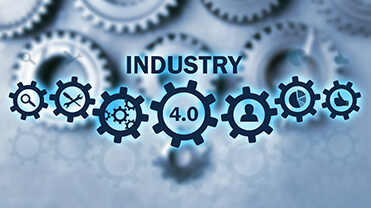unleashing the power of IIoT:
key considerations for industrial automation
The Industrial Internet of Things (IIoT) has become a transformative technology, reshaping global industries. It interconnects physical devices, machines, and systems through advanced sensors, actuators, and network connectivity. This enables seamless data exchange and real-time insights throughout the entire production ecosystem. IIoT, a subset of the Internet of Things (IoT), finds wide applications in industries such as oil and gas, manufacturing, automation, and utilities. It facilitates the implementation of advanced automation techniques like machine learning (ML) and artificial intelligence (AI), leading to adaptive and self-optimising production processes. Implementing IIoT across industries enhances efficiency, productivity, and safety, unlocking new possibilities in the era of Industry 4.0.
From harnessing the power of data to ensuring robust security measures, here are several key factors to consider when implementing IIoT for industrial automation:
data management and analytics
To optimise data management in IIoT systems, a robust real-time data collection mechanism is essential. Ensuring data quality requires additional mechanisms, such as data validation checks, eliminating duplication, and identifying and correcting anomalies. Efficient data storage depends on scalable and reliable storage infrastructure such as cloud-based solutions or distributed databases capable of handling high data volume and velocity. Advanced analytics techniques can then extract valuable information for predictive maintenance, and decision-making. Organisations can also consider deploying edge computing and edge analytics to process and analyse data closer to the source, reducing latency, minimising bandwidth requirements, and enabling real-time decision-making at the edge.
Softdel developed a modular, open-control IoT edge platform that connected the customer’s PLC systems to its IT systems, enabling our customer to strengthen their market position with real-time data insights, cost savings, and improved agility.
interoperability and standardisation
Ensuring compatibility and seamless communication among IIoT components is essential and forms the foundation for the crucial implementation of IIoT solutions. By adhering to industry standards and protocols such as MQTT, OPC UA, CoAP, and AMQP, easy integration and future scalability can be achieved, thereby promoting interoperability among various IIoT components. Embracing cloud and platform-agnostic architectures to build IIoT solutions allows flexibility across multiple cloud environments or edge computing platforms. Additionally, well-designed APIs that follow industry standards and best practices can enable seamless communication among different applications.
Softdel developed a flexible and interoperable real-time temperature monitoring solution for a leading player in the utility industry by enabling a range of connectivity protocols.
integration with legacy systems
Legacy systems such as SCADA or PLCs first need to be evaluated to assess how IIoT systems will integrate with them. The next step involves determining the need for retrofitting or upgrading existing infrastructure and exploring options for communication facilitation between old and new systems using gateways and adapters. In this context, compatibility challenges posed by proprietary or outdated communication protocols can be effectively addressed through protocol conversion mechanisms. By translating data exchanged between the IIoT solution and legacy systems, these mechanisms effectively bridge the gap between different protocols. In addition, the development of APIs facilitates seamless communication and integration between the IIoT solution and legacy systems.
Softdel revitalised a customer’s PCB-enabled gateway solution by incorporating modern hardware and software functionalities. The customer was able to seamlessly migrate to the new solution, and even benefitted from a highly reduced non-recurring engineering (NRE) cost as a direct result.
scalability
As the number of devices and data volumes increase, ensuring the growth of IIoT system becomes crucial. Companies can design a flexible architecture for easy expansion and integration of new devices and technologies, using networking technologies such as mesh networks or edge computing Leveraging cloud computing platforms like AWS, Azure, and Google Cloud can help with inherent scalability. Moreover, scalable data storage and processing solutions like distributed databases, data lakes, or NoSQL databases can handle the growing influx of data generated by IIoT devices.
Softdel empowered a prominent leader in flow measurement technologies by building a Bluetooth-based mobile app that unlocked numerous use cases and enhanced scalability.
security
Implementing IIoT systems requires prioritising robust security measures throughout the system, from device to cloud. IIoT systems should use secure communication protocols such as HTTPS, MQTT with TLS/SSL, or other industry-standard encryption methods, ensuring confidentiality while preventing interception. To restrict unauthorised interactions with IIoT devices and systems. robust access control mechanisms with strong password policies, multi-factor authentication, and role-based access controls should be implemented. Additionally, keeping all IIoT devices and software up to date with the latest security patches and firmware updates is also important, as is regularly checking for security advisories and patches provided by device manufacturers or vendors and promptly applying them to mitigate known vulnerabilities. This includes implementing intrusion detection systems and conducting regular security audits. However, it is critical to note that security is an ongoing process that requires constant evaluation and adaptation to address evolving threats and technologies.
Explore more about IoT device security measures in both the industrial and smart building context, in our article titled‘IoT device security – 5 key measures for device manufacturers‘.
reliability and redundancy
Industrial automation systems are critical for business operations, so it is essential to ensure high reliability and continuous operation. Implementing redundancy measures such as backup power supplies, redundant communication paths, and failover mechanisms help to minimise downtime. Organisations can design a fault-tolerant architecture that can withstand failures at various levels, including devices, network components, and cloud infrastructure, while implementing network redundancy with redundant network links, routers, and switches that ensure availability even if one component fails. Additionally, data integrity and availability can be ensured through redundant storage, distributed databases, and regular backups to secondary storage systems or cloud-based systems, mitigating the risk of data loss. Another measure can include implementing load-balancing mechanisms to evenly distribute workloads and prevent resource exhaustion.
In the age of disruptive IIoT technologies, partnering with experienced IIoT system integrators, or consultants, who provide expertise, support, and guidance throughout the process, is essential to harness the transformative power of this technology and drive growth and success in the digital age.








